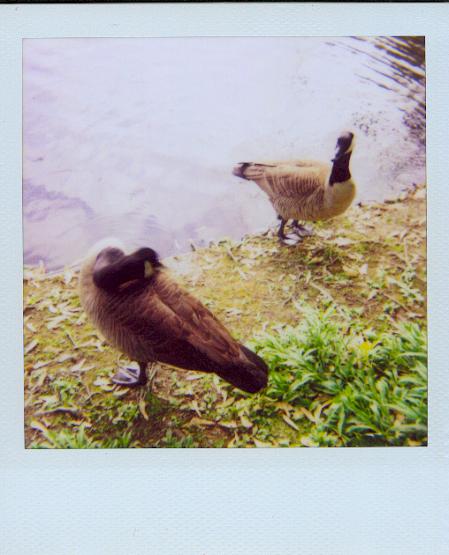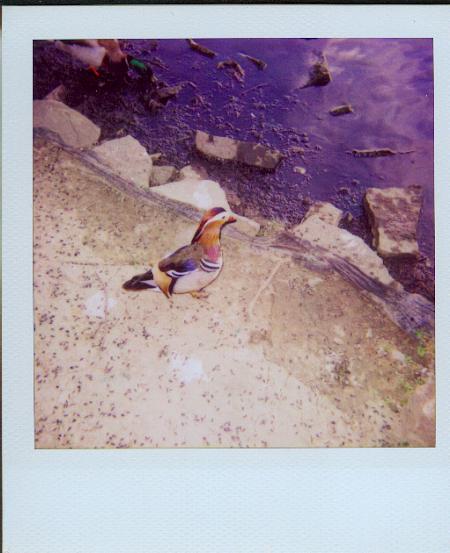is the word 'diary' better than the word 'blog'? probably not.
-----------------------------------------------------------------------------------------
on how my heart has been broken by a duck who may not even be a duck.
on how my heart has been broken by a duck who may not even be a duck.
Two geese.

One duck.

There�s something about all the animals around here that really opens up my heart in this strange way so that it is more exposed than usual on a daily basis. For instance I really love the Canadian geese at the pond. I watch them every day in the afternoon. Geese have a bad reputation but these geese are gentle and friendly and beautiful, and they make the most amazing noise when they land in the water from out of flight. As I watch the geese I always see, of course, ducks of various kinds, and also tiny tiny birds who land near me and look at me strangely and hop around. And there are turtles and large fish who sometimes peek up out of the water. And the damned bunnies and chipmunks and squirrels. Etc.
You all know I�ve been thinking about desire and human relationships lately, because you read my diary (you so crazy!). There was desire as something that repeats but is never the same, not to mention missing the point about what desire wants, and then realizing that to lots of people my life simply is not intelligible, and posing the question whether I�ll end up married to a man someday, where �man� and �married� stand for oppressive heteronormativity rather than my marital status. Apparently love (and/or desire) has been on my mind a lot.
Perhaps it�s just spring?
But then again, who needs an excuse? I love seeing other people in love, even when I�m most alone. I don�t understand why someone alone would begrudge someone else that thing alone-being tends to want: someone else. It�s a sad state of affairs to want to oppress the rest of the world with whatever you have to bear at present.
So today in the shower I was thinking (shower thinking is peculiar, is it not?) about love, abstractly rather than concretely, about what it is and what it requires of a person. And I think�and you can tell me whether this is a thought that should have stayed in the shower�that love is so grand because it escapes (or ought to escape) the relentless drive toward reciprocity that fuels so many of our human encounters.
The angry alone person who wants everyone else to be alone wants everyone to have the same things, and wants no one to have pleasures that he or she�the alone person�does not have at present. That is a particularly parsimonious form of reciprocity, but there you have it.
Many of our daily interactions with people are economic in nature, by which I mean they are based on exchange, which is also a form of reciprocity, tit for tat, this for that. You do your part & I do mine and if you do not do your part mine also ceases. Of course it is only fair that this is how things work some of the time. But that�s what it is�only fair�and we are capable of more than that. (Even legal justice can�t be achieved by fairness alone.)
So love gives us a rest from that relentless drive for reciprocity. (And here I don�t mean only romantic love, because if you really have friends, then you already have people who will act beyond reciprocity for you, I hope.) It�s not that when you give love you don�t care whether you get something back. Of course you do. In fact not getting something back when you give love is much more disheartening than any economic exchange gone awry. That is why people who give love are brave. But there is something about love that refuses to honor actions carried out only for the sake of reciprocity. It�s as if the body and mind become aware (together, because, let�s face it, they aren�t finally separable in this love thing) that in love you are asking something of yourself that you cannot ask of others. Perhaps others will ask this love-thing of themselves, but that is their affair. You cannot legislate it, force it, render it unto caesar or manipulate it into being. You offer what you have, because you have it. And the strangest part is that you have it not because it�s already in you but because someone else brought it out in you. Someone else, the very definition of the not-you, made something happen within you. You have been invaded! And yet there is no guarantee that what has been taken (or what you have given) will be returned. Free will operates differently in love than it does in politics or monetary exchange.
Think of it as the ambiguity of a kiss, where you seem to be grasping for something, committing an action, but yet in kissing you are not actually seeking to grasp but rather to be grasped. It�s an action that is passive. Or a passion that is active.
In short, strict reciprocity is over-rated. However, it is very nice to be loved.
In other news, semi-related, my heart seems to have been broken by a duck who may not even be a duck. Hanging out with the geese and the ducks is this lone figure, an attractive guy, who isn�t like any of the rest of them. (Already it sounds like a children�s tale, and it feels like one, too, except that I can�t think of the happy ending for it.) He is smaller than a �normal� duck, and he doesn�t quack but rather makes a weird peeping sound. But he has a short bill and duck feet. He has the most amazing punk rock purple and orange hairdo that sticks straight out from his neck in a point rather than conforming to his neck like a �normal� duck. Anyway, perhaps you know that ducks undergo a courting process, form pairs, and stick together. So you always see ducks in pairs, not alone, etc. It�s interesting to me that the ducks tend to pair up with ducks that are of the same duck-form, like mallards with mallards and white ducks with white ducks. There is one male mallard paired with what looks to me like a female widgeon (duck) but they are the only daring pair on the pond. And then there is the lovely, crazy-plumed, beautifully colored, and utterly alone duck who may or may not be a duck. He sits there, alone, every day, all day. He has no one to swim around with, or chase around, or run after bread with, or hammer at the mud with his beak with. Sometimes other ducks push him around, sometimes he shoos ducks away from him. But mostly he just stands there on the pond-edge, alone, in his alone-ness, watching the other ducks and geese in their non-aloneness. IT IS HEARTBREAKING! And he is so brightly colored, he sticks out like a professor in pink motorcycle boots at Amherst College! How did he end up here alone?! Why do the other ducks not want to hammer in the mud with him? (iykwim)
[pause.]
I just did a google image search on �ducks� and found out that my lonesome bird is a male wood duck. I also found out that wood ducks nest in trees near water, and that it is possible that the male wood duck has a honey nesting on some eggs in a tree somewhere. Wood ducks nest in trees and then the babies just jump to the ground, 60 feet or more, and usually they live. Anyway, maybe he has a honey in a tree somewhere nearby, though the articles I�ve read say that wood ducks usually stay together during the molting period, and that they don�t usually hang out alone. Why is he alone? OK I think it is safe to say that I am officially obsessed with the handsome stoic lonesome duck and his long lost [anthropomorphized] love.

12:11 a.m. - May 11, 2006
-----------------------------------------------------------------------------------------
|
|
